Mitochondrial Disorders
Mitochondrial disorders arise from mutations in mitochondrial DNA, which is exclusively inherited from your mother. These conditions can affect energy production in cells, leading to symptoms ranging from muscle weakness to more severe neurological issues. Understanding the maternal link can help in early diagnosis and management.


These disorders stem from defects in the tiny powerhouses of our cells. Because mitochondria are maternally inherited, issues typically pass from mother to child. Symptoms can be varied but often involve muscle and neurological function, highlighting the profound influence of maternal genetics on our health.
Lactose Intolerance
Lactose intolerance, a common condition where the body can't digest lactose in dairy, often links back to maternal heredity. If your mom struggled with dairy digestion, chances are you might too. Knowing this can help adjust dietary habits to avoid discomfort and ensure nutritional balance.


Do you experience discomfort after a glass of milk? You might have inherited lactose intolerance from your mother. This condition means you lack the enzyme to break down lactose, which is common among those with genetic predispositions from their maternal line.
Type 2 Diabetes
While lifestyle and environment strongly influence Type 2 diabetes, genetics play a major role, particularly from the maternal side. If it runs in your maternal family, there's a higher chance of developing it. Being aware can motivate lifestyle changes to manage or prevent this condition.


If your mother or maternal relatives have Type 2 diabetes, it might be a red flag for you. The genetic connection means higher susceptibility, although diet, exercise, and weight management remain crucial in prevention and control. It's a call to mindful living.
Cystic Fibrosis
Cystic fibrosis is a serious, inherited disease affecting the lungs and digestive system. If your mom carries the gene, you might inherit this condition characterized by thick, sticky mucus. Early detection through understanding family history can lead to better management.


This life-threatening disorder primarily affects breathing and digestion. Passed down through recessive genes, if both your parents carry the gene, you might develop it. Knowing your family's genetic history, especially your mom's, is vital in understanding your risk.
Breast Cancer Genes
Breast cancer genes like BRCA1 and BRCA2 are infamous for increasing cancer risks and are often inherited from the mother. If she carries these mutations, there's a significant chance you might too. Genetic testing can offer crucial insights into your cancer risk profile.


If your mother had a history of breast cancer or carried BRCA gene mutations, you might be at heightened risk. These genes dramatically increase your chances of developing breast cancer, emphasizing the importance of genetic counseling and proactive health screenings.
Hemophilia
Hemophilia is an inherited bleeding disorder where blood doesn't clot properly due to a deficiency of clotting factors. It's passed down through the X chromosome, primarily affecting males while females are typically carriers. Many learn to manage it well with professional healthcare guidance.


Members of royal families have historically been known to pass down hemophilia, earning it the nickname 'the royal disease.' This condition requires living with the constant caution of internal bleeding, treated with regular clotting factor therapy to maintain a balanced lifestyle.
Alzheimer's Risk
Your genetic makeup can play a crucial role in your susceptibility to Alzheimer's. Inheriting specific genes from your mother might elevate your risk. While genetics can't be changed, lifestyle factors like diet and exercise can help manage this predisposition effectively.


Alzheimer's risk can increase if your mother had the disease, particularly if she carried certain gene variants like APOE-e4. It's important to engage with activities that stimulate the brain and maintain a healthy lifestyle as preventive measures that complement understanding your genetic risks.
Huntington's Disease
Huntington's Disease is a genetic disorder that causes the progressive breakdown of nerve cells in the brain. If one parent has the gene mutation, there's a 50% chance it can be passed to offspring, leading to symptoms like movement disorders and mental decline over time.


The writhing movements and cognitive challenges of Huntington's Disease often appear mid-life, striking those with the hereditary gene. While there's no cure currently, ongoing research and supportive therapies offer hope and improved quality of life for affected families.
Autosomal Dominant Traits
Autosomal dominant traits are inherited when a single copy of the mutated gene from one parent is sufficient to cause a condition. Common examples include Marfan syndrome or certain types of hearing loss, where just one affected parent can convey the trait to offspring.


Traits expressed through autosomal dominance often manifest early in life and require only one copy of a mutated gene. With both parents having different genes, each child has a 50% chance of inheriting such traits, spotlighting the intricacies of our genetic blueprint.
Color Blindness
Predominantly affecting males, color blindness is often passed down from mother to son through X-linked inheritance. It usually involves difficulty distinguishing between red and green hues, impacting daily activities but often accommodated with visual aids and technology.


In a world rich with color, those with color blindness live in a unique visual spectrum, largely shaped by genetics originating from their mother. While irreversible, adaptive tools and environmental modifications help in navigating a perception that's different yet equally vibrant.
Muscular Dystrophy
Muscular dystrophy encompasses a group of genetic diseases characterized by progressive muscle weakness and loss. These conditions often run in families, affecting mobility and quality of life. Being aware of its presence in your family can help manage symptoms and seek timely interventions.


This inherited disorder leads to the weakening of muscles over time, impacting daily activities and independence. By understanding the genetic nature of muscular dystrophy, individuals can explore early support and treatment options to improve quality of life and delay symptom progression.
Bipolar Disorder
Bipolar disorder is a mental health condition characterized by extreme mood swings ranging from manic highs to depressive lows. Genetic factors play a significant role in its development, making it crucial to know your family's mental health history for early diagnosis and effective treatment.


Experience soaring manic highs and deep depressive lows with bipolar disorder, a condition heavily influenced by genetics. Awareness of its symptoms and familial ties can lead to proactive mental health management, ensuring better therapeutic approaches and lifestyle adaptations.
Marfan Syndrome
Marfan syndrome is a genetic disorder affecting connective tissues, leading to elongated limbs and cardiovascular issues. Early detection in those with a family history can facilitate proactive management and reduce the risk of serious health complications through regular monitoring and lifestyle adjustments.


Those with Marfan syndrome often face challenges related to disproportionate body features and heart issues, stemming from inherited genetic mutations. Comprehensive knowledge of this condition enables timely interventions, potentially preventing severe complications and enhancing life expectancy.
Hereditary Neuropathy
Hereditary neuropathy encompasses a range of genetic disorders that affect the peripheral nerves, leading to muscle atrophy and sensory changes. Understanding its familial roots can aid in early recognition and management, minimizing the impact on daily living and enhancing quality of life.


This group of inherited conditions impacts nerve function, causing weakness and sensory issues. Genetic insights into hereditary neuropathy allow families to anticipate challenges early, optimizing care strategies and enabling patients to maintain independence for longer periods.
Familial Hypercholesterolemia
Familial hypercholesterolemia is a genetic condition that results in high cholesterol levels from an early age, increasing the risk of heart disease. By understanding its hereditary nature, individuals can implement lifestyle changes and medications to significantly reduce cardiovascular risks.


Inheriting familial hypercholesterolemia means facing a lifetime of managing elevated cholesterol levels. Early genetic screening can identify risk factors, enabling interventions such as dietary adjustments and medical treatments to combat the onset of heart-related concerns effectively.
Thalassemia
Thalassemia is a genetic blood disorder that results in the abnormal formation of hemoglobin. This condition can lead to excessive destruction of red blood cells, resulting in anemia. Recognizing traits early can help in managing symptoms and ensuring a better quality of life.
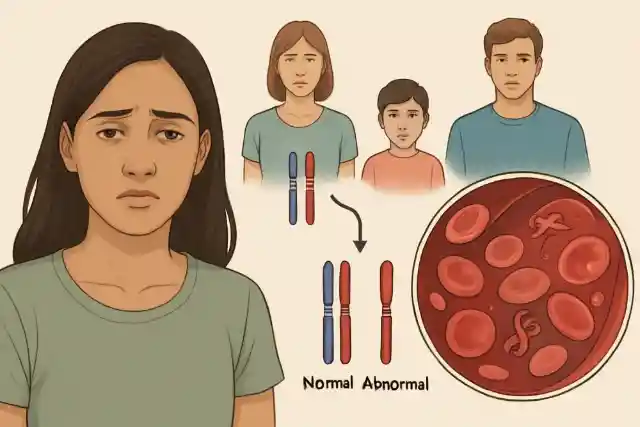
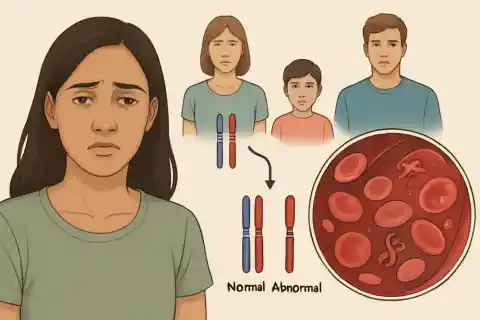
Inherited from one or both parents, thalassemia often requires routine blood transfusions or other treatments to maintain healthy hemoglobin levels. Awareness and early diagnosis can prevent severe complications, making genetic counseling beneficial for families at risk.
Sickle Cell Anemia
Sickle Cell Anemia is a hereditary disease where red blood cells become misshapen, resembling a sickle. This leads to blockages in blood flow causing pain and potential complications. Understanding this disorder's progress can help in effectively managing and minimizing flare-ups.
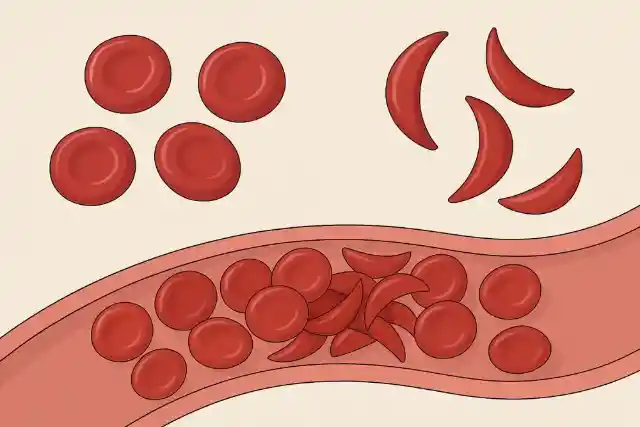
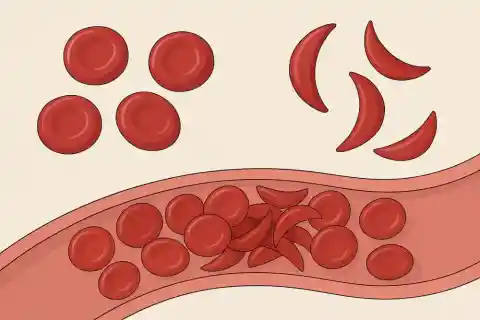
Formed from mutated hemoglobin, Sickle Cell Anemia can severely impact a person's health if not properly managed. Regular health checks and new medical treatments offer hope, improving quality of life and extending life expectancy for those affected.
Schizophrenia
Schizophrenia is a complex mental health disorder that interferes with a person's ability to think clearly, manage emotions, and relate to others. It often runs in families, indicating a genetic link, but environmental factors also play a significant role in its development.


Characterized by delusions, hallucinations, and impaired cognitive function, schizophrenia requires comprehensive treatment plans. Early diagnosis and a strong support system are crucial to managing symptoms and enhancing the individual's daily functioning.
Osteoporosis
Osteoporosis is a condition where bones become weak and brittle, often making them susceptible to fractures. This disease can be passed down genetically, particularly among women. Calcium-rich diets and strength-training exercises are preventive strategies worth considering.


With aging and family history pegged as major risk factors, osteoporosis requires vigilant monitoring and lifestyle adjustments. Ensuring regular bone density screenings and incorporating vitamin D can significantly help in improving bone health and preventing major injuries.
Hypertension, or high blood pressure, can be a hereditary condition influenced by diet, lifestyle, and stress. Often devoid of symptoms, it increases the risk of heart disease and stroke, making regular monitoring crucial for long-term wellbeing.


Known as the silent killer, hypertension lurks without noticeable symptoms but can damage the body quietly over time. Genetic predisposition means attentive lifestyle adjustments and medical intervention can help in keeping blood pressure at healthy levels.
Endometriosis
Endometriosis occurs when tissue similar to the lining inside the uterus grows outside it, often inherited maternally. This painful condition can lead to fertility problems and is influenced by your genes, sometimes requiring surgery or hormonal treatments to manage symptoms.


A complex condition often passed from mother to daughter, endometriosis causes uterine-like tissue to grow outside the uterus. Symptoms include chronic pain and infertility, and understanding the genetic link can help in seeking appropriate treatment and managing quality of life.
Polycystic Ovary Syndrome
Polycystic Ovary Syndrome (PCOS) is a hormonal disorder common among women of reproductive age, often passed down through family lines. Characterized by irregular menstrual periods and high levels of male hormones, managing PCOS involves lifestyle changes and medical interventions.
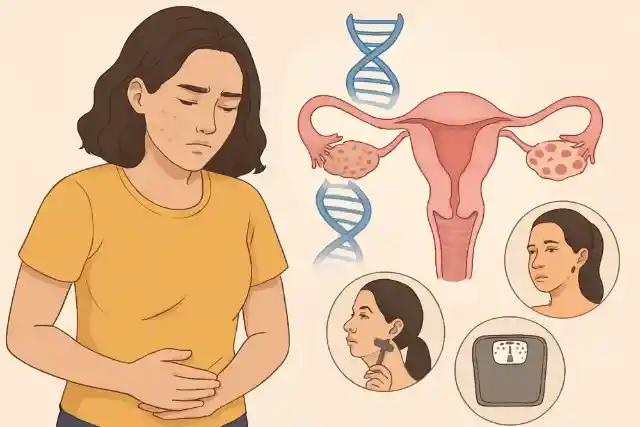
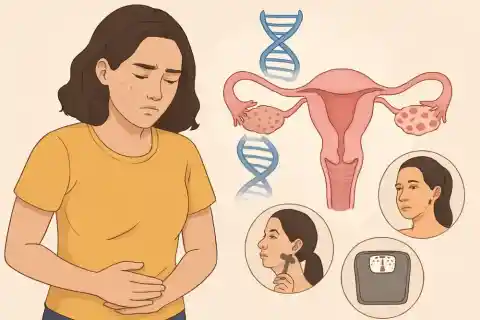
Genetic factors play a significant role in developing Polycystic Ovary Syndrome, a condition affecting hormone levels and ovulation. Symptoms can include acne, weight gain, and increased body hair, with treatment options ranging from birth control pills to insulin-sensitizing medications.
Depression Genes
Depression genes can be inherited from your mother, influencing your susceptibility to mood disorders. While genetics play a role, it's essential to consider environmental factors and seek support, therapies, or medications to manage symptoms and foster mental well-being.


The hereditary nature of certain depression genes means your emotional health may be influenced by family history. Understanding this link can encourage early intervention with therapies like cognitive-behavioral therapy, lifestyle changes, and medication to maintain mental health.
Ehlers Danlos Syndrome
Ehlers Danlos Syndrome is a group of connective tissue disorders passed genetically. Known for hypermobile joints and fragile skin, it can cause chronic pain and frequent injuries. Family history plays a key role, highlighting the importance of specialized care and management strategies.


Genetically inherited, Ehlers Danlos Syndrome affects collagen, leading to flexible joints and skin that bruises easily. This condition may manifest differently in each individual, demanding personalized medical advice and therapies to manage lifelong symptoms effectively.
Hearing Loss
Hearing loss may be inherited from your mother, with genetic factors determining your vulnerability to this condition. Often detected early in life, maternal history of deafness or hearing impairment highlights the need for regular auditory check-ups and early intervention services.


Genetic transmission through maternal lines can lead to congenital hearing loss, impacting communication abilities. Identifying a family history helps explore early screening and advanced technological aids or cochlear implants to support listening and speech development.
Migraine Genetics
Migraines can often be traced through maternal lineage, making it a condition worth monitoring if your mother suffers from this intense headache disorder. Understanding the genetic basis opens pathways to tailored treatments and preventive strategies.


If you've inherited migraines, you're certainly not alone. Research indicates a strong genetic component, particularly from the maternal side, playing a role in the frequency and severity of migraine attacks.
Narcolepsy
Narcolepsy is a sleep disorder that disrupts your regular sleep-wake cycles and can be linked to genetic inheritance. If your mother shows symptoms, it's important to assess your sleep patterns and seek medical advice.


Understanding narcolepsy's genetic roots helps in recognizing early signs and accessing interventions. If you have a narcoleptic parent, discussing your sleep sensations with a doctor is crucial for diagnosis and management.
Rheumatoid Arthritis
Rheumatoid arthritis often runs in families, with genetic markers indicating a predisposition passed down, particularly from mothers. This autoimmune disorder requires early intervention for effective management.


The risk of developing rheumatoid arthritis increases if a close relative, like your mother, has it. Genetics majorly influence how the body's immune system behaves, alerting you to watch out for early symptoms.
Psoriasis
Psoriasis, a skin condition characterized by itchy, scaly patches, is another illness with a hereditary component. If your mother deals with psoriasis, monitoring your skin changes can help in diagnosing it early.


Genetic links to psoriasis suggest that family history is a key factor in developing this condition. It underscores the importance of being vigilant about any skin abnormalities if a parent has shown similar issues.
Asthma
Asthma often has hereditary links, with maternal genetics playing a significant role in its onset. Awareness of your mother's health history can inform preventive measures and tailored asthma management.


If asthma runs in your family, particularly through maternal lines, there are higher chances of inheriting this respiratory condition. Knowledge of asthma's genetic underpinnings can aid in using preventive treatments effectively.
Ankylosing Spondylitis
Ankylosing Spondylitis is a type of arthritis that predominantly affects the spine, causing inflammation, pain, and potential fusion of the vertebrae over time. While the exact cause is unknown, genetics play a significant role, and this condition can often be traced back to family history, especially on your mother's side.


This chronic condition primarily targets the spinal ligaments and joints, leading to stiffness and discomfort. With a strong genetic link, individuals with a family history of Ankylosing Spondylitis, especially maternal, should be aware of potential early symptoms for timely intervention and management.
Tay Sachs Disease
Tay Sachs Disease is a rare genetic disorder that progressively destroys nerve cells in the brain and spinal cord. This condition is often passed from parents through the HEXA gene mutation, and knowing your family's genetic background, particularly matrilineal, can help assess risk and guide genetic counseling choices.
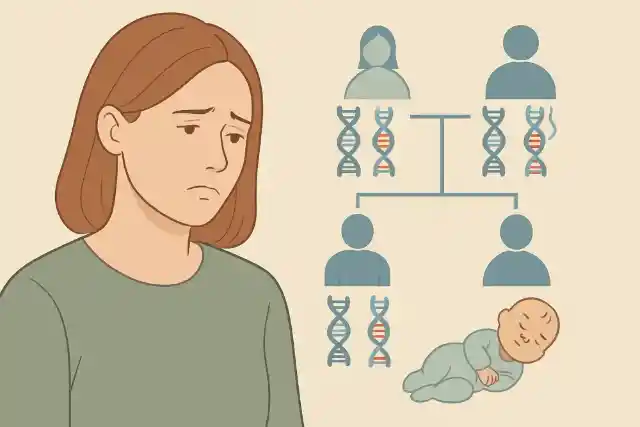
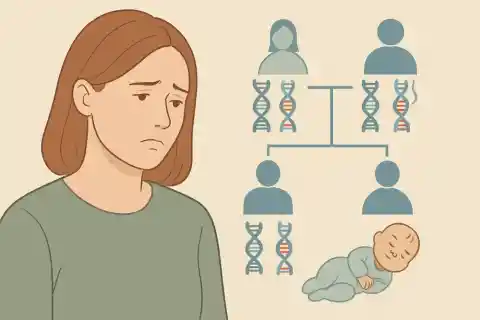
A severe neurological disorder, Tay Sachs is known for its hereditary nature, often passed down through a defective gene from carriers who may themselves be symptom-free. Testing and awareness are vital, particularly for those with familial connections to affected populations, to understand risks and plan family futures.
Duchenne Muscular Dystrophy
Duchenne Muscular Dystrophy primarily affects boys and is known for causing severe muscle degeneration. This condition is linked to the X chromosome, often inherited from a carrier mother. Understanding maternal genetics provides crucial insights into this disease which typically emerges in early childhood.
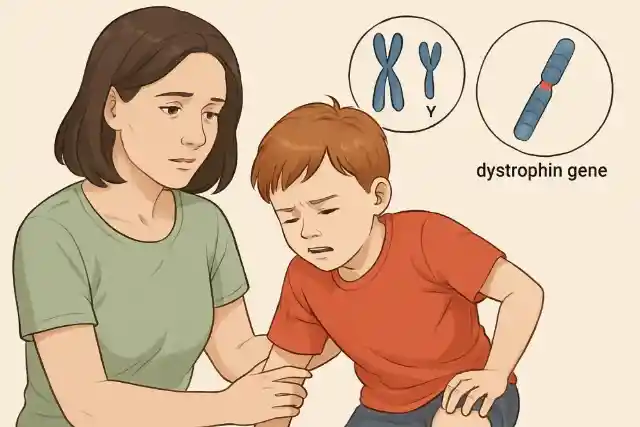

Characterized by progressive muscle weakness, Duchenne Muscular Dystrophy results from mutations in the dystrophin gene located on the X chromosome, often passed from mother to son. Early detection and familial knowledge are crucial for management and potential interventions as medical advances continue.
Retinoschisis
Retinoschisis is an eye condition that leads to the splitting of the retina's layers, affecting vision. This disorder can have a genetic basis, primarily linked to mutations on the X chromosome. Family medical history, especially maternal links, can offer insights into the risk factors and guide monitoring strategies.


This vision problem, often inherited through a familial pattern, causes progressive vision issues due to the retina's layers separating. Knowing your family's genetic history, especially through maternally inherited traits, can be essential in devising a preventive or corrective approach to mitigate vision loss.
Celiac Disease
Celiac Disease is an autoimmune disorder where ingestion of gluten leads to damage in the small intestine. Familial inheritance, especially maternal, increases susceptibility. Awareness and early lifestyle adjustments can significantly alleviate symptoms and improve quality of life by strategic dietary management.


Linked to genetic predisposition, Celiac Disease results in an adverse reaction to gluten, leading to nutrient malabsorption. If your family, particularly maternal side, has a history of Celiac, genetic testing and dietary vigilance are recommended to manage this hereditary autoimmune condition effectively.
Von Willebrand Disease
Von Willebrand Disease is a common bleeding disorder caused by a deficiency of von Willebrand factor, a protein crucial for blood clotting. It often leads to easy bruising and frequent nosebleeds. Understanding your family history can help in early detection and management.

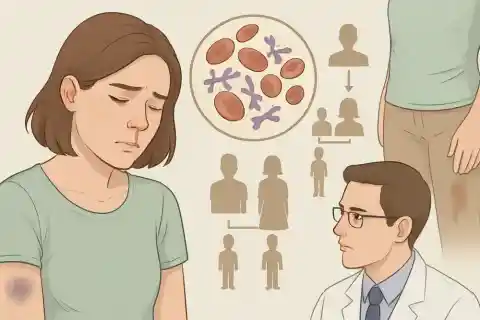
Inherited from your mother or father, Von Willebrand Disease affects the blood's ability to clot. While it affects both genders, women may experience heavy menstrual bleeding. Regular consultations with a hematologist can significantly aid in handling this genetic condition.
Phenylketonuria
Phenylketonuria, commonly known as PKU, is a rare metabolic disorder where the body fails to break down phenylalanine. It can lead to intellectual disabilities if untreated. Early screening and a controlled diet can help manage its effects and allow for a normal lifestyle.


PKU is an inherited condition that prevents the metabolism of the amino acid phenylalanine. This genetic disorder requires lifelong dietary restrictions to prevent serious health issues, highlighting the importance of early testing for newborns to ensure healthy development.
Fragile X Syndrome
Fragile X Syndrome is a genetically inherited condition leading to intellectual disabilities, more commonly in males. It's caused by mutations in the FMR1 gene. The impact on communication and social interaction underscores the need for early intervention and supportive therapies.


A leading cause of inherited intellectual disability, Fragile X Syndrome results from a mutation on the X chromosome. It can present challenges such as attention deficits and hyperactivity. Understanding its implications is crucial for providing the best care and educational support.
Gaucher's Disease
Gaucher's Disease is a genetic disorder where fatty substances accumulate in certain organs, impairing their function. Symptoms may include enlarged liver and spleen, bone pain, and fatigue. Enzyme replacement therapy offers a treatment option, thanks to advances in medical research.


An autosomal recessive condition, Gaucher's Disease is characterized by a deficiency in the enzyme glucocerebrosidase. This leads to accumulation of lipids in cells, affecting multiple body systems. Genetic counseling is vital for families with a history of this condition.
Wilms Tumor
Wilms Tumor is a kidney cancer commonly found in children, with genetic factors playing a significant role. Early signs include abdominal swelling and pain. Advances in treatment approaches, such as surgery and chemotherapy, have significantly improved survival rates for young patients.


A genetic predisposition can increase the risk of Wilms Tumor, especially in children. Often detected in children under five, this kidney tumor requires prompt medical intervention. A thorough family medical history helps assess risk and guide timely diagnostic measures.